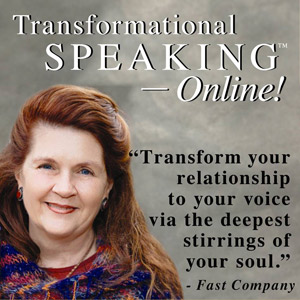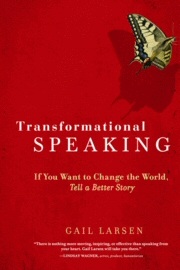Don’t Sanitize (or Dramatize!) Your Story: A Lesson in the Power of Real Emotion

Omega Institute
When teaching at Omega Institute last summer, I received a poignant reminder of the power of expressing our emotions as we speak. A woman in my class moved us all with her heartbreaking and heart-opening story. First we learned of the medical error that led to her loss of the child she was carrying, and then she shared her journey of healing that led her to Rwanda and a profound experience of forgiveness.
When Tina finished her story, we were in a place that was beyond words. Those are the rare moments where as speakers we must be willing to inhabit the stillness and allow ourselves to feel rather than fill the space with words. She stood in silence. As her coach, I did the same.
How often we step in to try to comment on the indescribable. Instead, our Omega group sat in the quiet for several minutes. Then I played Leonard Cohen’s “Anthem” for its message, “Ring the bells that still can ring, forget your perfect offering. There is a crack in everything, that’s how the light gets in.”
We joined in a circle and still, I had no words. It was late in the day. I saw my tendency to want to somehow lighten the profound emotion we were feeling. After all, as the facilitator, isn’t it my job to be sure everyone is okay?! (Ha!) Instead, I closed our afternoon by acknowledging that this deep feeling was not something I could tie a bow on as we went our way for the evening. I had to surrender to something beyond my capacity so that we could simply be with a silence that spoke volumes, wherever that took us.
I believe those rare moments where there are no words take us to the place Rumi speaks of when he said, “Out beyond ideas of right doing and wrongdoing, there is a field. I will meet you there.” That is the fertile field where there is no judgment and therefore no separation. As speakers, we can’t plan for these moments of grace, but oh the value of lingering when they arrive!
Tina later told me the relief she felt because I had coached her to express her truth rather than accept the carefully crafted talk with which she arrived. A year ago she had attended a high-profile conference where she had been advised by a best-selling author not to show her emotions when telling her story. And certainly not to tear up! As a result, she stopped speaking and shut down her voice for a year. Her willingness to return to the truth of her experience without sanitizing it to avoid discomfort for herself or her audience allowed us to go deep into our own stories of loss. From there we could hear her message of reconciliation and consider a new way to hold our individual experiences of betrayal.
The question “What happens if I cry?” often comes up when I’m working with groups. We’ve all seen speakers who cry on command as part of their performance, and we sense when they are putting on a dramatic act for effect. It actually brings their credibility into question. But real emotion is quite different because it invites the audience to tap into their own experiences and connect with their own stories.
We can’t tell a story when we are reeling and raw; we need time to process and heal. But our most challenging experiences often become the source of our greatest learning and the lessons we have to share. Those stores need to be told. And if we sanitize our story so it no longer reaches into our own depths, how can it possible reach another? It’s not about being raw but about being real.
What Story Keeps You Stuck?
Tina Klonaris-Robinson later wrote on her blog about her experience in the class and what happened when she moved from the script that gave her control to the full expression of her story. And when I asked her permission to share it, she added her comments below. What a profound realization that by sticking with the same rehearsed narrative, we keep from changing the story about our lives. This lesson begs the question: what story are you telling that keeps you stuck?
“Whether we are speaking in public or simply sharing with friends, sometimes we pretend that all is well … or we share only what we think people want to hear. So often our stories or conversations are rehearsed in that we don’t know how to change the story about our life because we tell it the same way over and over, whether we are in that place or not. In doing so, it is difficult to grow and become something new. But… when we speak from where we really are, from that brilliant deep place within our hearts, when it is authentic and real, that is where we find the beauty. This is where powerful and amazing things happen for the person speaking and the one listening. Gail’s workshop connected me back to my heart again… and I realized how vitally important it is to stay connected to heart… to feel every emotion, painful, sad…happy… whatever it may be. This is where healing and great transformations occur!”
Thanks, Tina!





